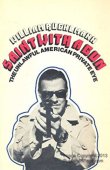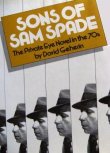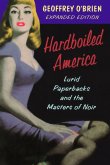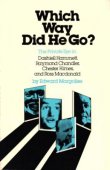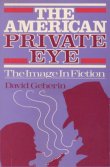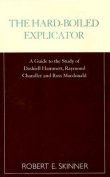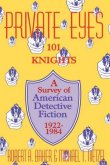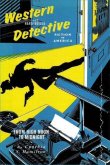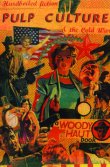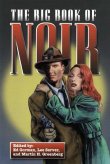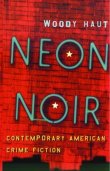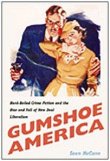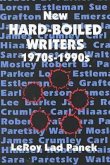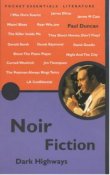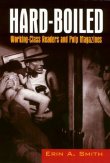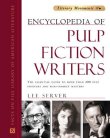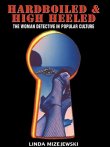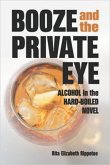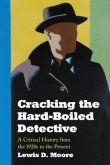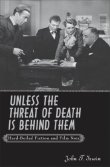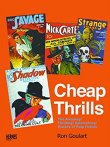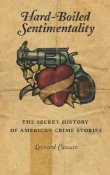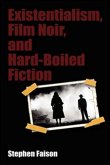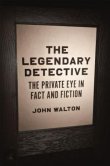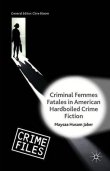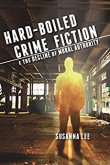On this pageHard-boiled, private eye, noir and pulp fictionThis page lists non-fiction books about private eye, hard-boiled, noir and pulp fiction.
|
| Hard-boiled, private eye, noir and pulp fiction | |
Saint with a Gun: The Unlawful American Private EyeWilliam RuehlmannNew York University Press1974
"A penetrating analysis of the American mentality as seen through private eye fiction. Ruehlmann traces the American Detective personality back to its roots, the lawman of the Old West rather than the civilized British inspector, and explains our man's psyche in terms of the nation's makeup, peculiar or perverse as it may be. Included among writers discussed are Mickey Spillane, Ross MacDonald, Donald Westlake, Dashiell Hammett and Raymond Chandler - all names who have been entertaining America for years." |
Buy from amazon.co.uk |
Sons of Sam Spade: Private Eye Novel in the 70'sDavid GeherinFrederick Ungar1980
"Examines the state of the private-eye genre in the 1970s, concluding that the contemporary private-eye figure is somewhat younger, even more cynical, and much more political than his forties countepart." |
Buy from amazon.co.uk |
Hardboiled America: Lurid Years of PaperbacksGeoffrey O'BrienVan Nostrand Reinhold1981 An expanded edition was published by Da Capo Press in 1997 with the title Hardboiled America: Lurid Paperbacks And The Masters Of Noir.
"Dashiell Hammett, Mickey Spillane, James M. Cain, Raymond Chandler, Jim Thompson, David Goodis … these are a few of the masters of noir responsible for the great lurid paperbacks of the thirties, forties, and fifties. With titles like The Big Sleep, Kiss Tomorrow Goodbye, and Street of the Lost, with racy cover lines like "My gun-butt smashed his skull!" and "Ruthless terror ripped away the mask that hid cold fear," and with some of the most extraordinary cover illustrations ever to grace American literature, these paperbacks held the ingredients of American nightmares. In Harboiled America—lavishly illustrated with 135 paperback covers, and expanded with new material on Thompson, Goodis, and others—Geoffrey O'Brien masterfully explores the art, history, and ideas of the American paperback." |
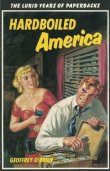 Buy from amazon.co.uk |
Which Way Did He Go? The Private Eye in Dashiell Hammett, Raymond Chandler, Chester Himes and Ross MacDonaldEdward MargoliesHolmes & Meier1981
|
Buy from amazon.co.uk
|
The American Private Eye: The Image in FictionDavid GeherinFrederick Ungar1984
"Describes twenty-seven fictional detectives, looks at the major novels and stories in which they appeared, and discusses trends in detective fiction." |
Buy from amazon.co.uk |
The Hard-Boiled Explicator: A Guide to the Study of Dashiell Hammett, Raymond Chandler and Ross MacdonaldRobert E. SKinnerScarecrow Press1985
"During the past thirty years, that uniquely American artform known as the hard-boiled mystery novel has come under increasing scrutiny by critics, scholars, and students alike. Literally hundreds of articles and books have been devoted to the subject, particularly to its three major practitioners, Dashiell Hammett, Raymond Chandler, and Ross Macdonald. Now, for the first time, those interested in this field have available to them a carefully constructed guide to the wealth of information on this subject. The Hard-Boiled Explicator will be of immense value to librarians, scholars, students, and mystery oficionados." |
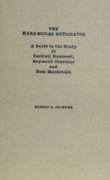 Buy from amazon.co.uk |
Private Eyes: One Hundred and One Knights : A Survey of American Detective Fiction, 1922-1984Robert A. Baker & Michael T. NietzelPopular Press of Bowling Green State1985
"Private Eyes is the complete map to what Raymond Chandler called 'the mean streets', the exciting world of the fictional private eye. It is intended to entertain current PI fans and to make new ones." |
Buy from amazon.co.uk |
Western and Hard-Boiled Detective Fiction in America: From High Noon to MidnightCynthia S. HamiltonUniversity Of Iowa Press1987
|
Buy from amazon.co.uk |
Pulp Culture: Hardboiled Fiction and the Cold WarWoody HautSerpent's Tail1996
"Pulp Culture takes the reader on a walk down the Mean Streets of post-war America to investigate the classic texts of American hardboiled crime fiction and the era from which they came. With crooks hiding in every doorway and commies lurking under every bed, crime fiction - its gaudy paperback covers portraying men with guns and women with low necklines - was avidly read by a nation adjusting to the Cold War and the Atomic Era. Pulp Culture gives post-war crime fiction a political and irreverent reading, examining the politics of paranoia, private detection and criminality; the origins of crime fiction; the role of women in a male-dominated genre; and why the early 1960s marked the final days of classic hardboiled fiction." |
Buy from amazon.co.uk |
The Big Book Of NoirEditor: Ed Gorman, Lee Server and Martin H. GeenbergCarroll & Graf1998
"A compendium of articles and interviews about film noir and its spin-offs - novels, TV and radio shows, and comic books."The contents are:
|
Buy from amazon.co.uk |
Neon Noir: Contemporary American Crime FictionWoody HautSerpent's Tail1999
"From the Kennedy assassination to the Vietnam War and Watergate, through Reaganomics to Irangate and Whitewater, Neon Noir is a roller-coaster ride through the American nightmare. Haut investigates the dark side of America through the work of crime writers such as James Ellroy, Elmore Leonard, Walter Mosley, James Lee Burke, Lawrence Block, James Sallis, George Pelecanos, Charles Willeford, Jerome Charyn, Sara Paretsky, Vicki Hendricks, KC Constantine, George V Higgins and James Crumley. Mapping the fissures and scars of America's psychogeography, its morally ambiguous shadowlands, Neon Noir also considers the difference between past and present hardboilers, the impact of war and journalism on noirists, the portrayal of cities, the aesthetics of crime fiction, and the changing relationship between the books and the films." |
Buy from amazon.co.uk |
Gumshoe America: Hard-Boiled Crime Fiction and the Rise and Fall of New Deal LiberalismSean McCannDuke University Press2000
"In Gumshoe America Sean McCann offers a bold new account of the hard-boiled crime story and its literary and political significance. Illuminating a previously unnoticed set of concerns at the heart of the fiction, he contends that mid-twentieth-century American crime writers used the genre to confront and wrestle with many of the paradoxes and disappointments of New Deal liberalism. For these authors, the same contradictions inherent in liberal democracy were present within the changing literary marketplace of the mid-twentieth-century United States: the competing claims of the elite versus the popular, the demands of market capitalism versus conceptions of quality, and the individual versus a homogenized society." |
Buy from amazon.co.uk |
New Hard-Boiled Writers: 1970s-1990sLeroy Lad PanekBowling Green University Popular Press2000
"Beginning in the 1970s, a new generation of writers took over the hard-boiled story and transformed it to fit the realities of their world—a universe infected by violence, greed, racism, sexism, war, and commercialism. The author comments both on the way the hard-boiled story has changed over the past three decades and examines the work of ten significant contemporary hard-boiled writers. Chapters on Robert B. Parker, James Crumley, Loren Estleman, Sara Paretsky, Sue Grafton, Carl Hiaasen, Earl Emerson, Robert Crais, James Lee Burke, and Walter Mosley demonstrate how these writers have used the hard-boiled hero to make powerful statements about life in the last quarter of the twentieth century." |
Buy from amazon.co.uk |
Noir Fiction: Dark HighwaysPaul DuncanOldcastle Books2000
"The literary style of noir both influenced and was influenced by its cinematic equivalent, film noir. Both document the adventures of hard-boiled detectives and double-crossing dames, and often feature a backdrop of corruption and ambiguity and twisted storylines that leave the characters confused and adrift. As well as the quintessential noir authors James M. Cain and James Ellroy, you can read about such lesser known British innovators as Gerald Kersh and Derek Raymond, both of whom have written landmark novels in the development of noir fiction. As well as having an introductory overview, 9 of the most significant authors in the history of noir fiction are profiled in depth. Additionally, there's a handy reference section for readers who want to know more." |
Buy from amazon.co.uk |
Hard-Boiled: Working-class Readers and Pulp MagazinesErin A. SmithTemple University Press2000
"In the 1920s a distinctively American detective fiction emerged from the pages of pulp magazines. The hard-boiled stories published in Black Mask, Dime Detective, Detective Fiction Weekly, and Clues featured a new kind of hero and soon challenged the popularity of the British mysteries that held readers in thrall on both sides of the Atlantic. In Hard-Boiled Erin A. Smith examines the culture that produced and supported this form of detective story through the 1940s. Relying on pulp magazine advertising, the memoirs of writers and publishers, Depression-era studies of adult reading habits, social and labor history, Smith offers an innovative account of how these popular stories were generated and read." |
Buy from amazon.co.uk |
Encyclopedia of Pulp Fiction Writers: The Essential Guide to More Than 200 Pulp Pioneers and Mass-market MastersLee ServerFacts On File2002
"From the early days of dime novels to contemporary mass-market paperbacks, pulp fiction is a vital part of popular culture. This volume offers a survey of the scores of well-known and unsung heroes of popular literature. It seeks to cover the entire spectrum of pop literature's greatest entertainers and artists; the multimillion-copy bestsellers; and the inventors of the modern genres, such as the western, the hardboiled detective novel, the spy thriller, science fiction, horror, the legal thriller, crime fiction and the erotic/romance novel. The work also profiles colourful but lesser-known underground figures, as well as a wide variety of talented paperback authors who were never given their due." |
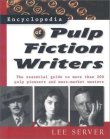 Buy from amazon.co.uk |
Hardboiled and High Heeled: The Woman Detective in Popular CultureLinda MizejewskiRoutledge2004
"Can a gumshoe wear high heels? In a genre long dominated by men, women are now taking their place-as authors and as characters-alongside hard-boiled legends like Sam Spade and Mike Hammer. Hardboiled and High Heeled examines the meteoric rise of the female detective in contemporary film, television, and literature. Richly illustrated and written with a fan's love of the genre, Hardboiled and High Heeled is an essential introduction to women in detective fiction, from past to present, from pulp fiction to blockbuster films." |
Buy from amazon.co.uk |
Booze and the Private Eye: Alcohol in the Hard-Boiled NovelRita Elizabeth RippetoeMcFarland & Co2004
"The hard-bitten PI with a bottle of bourbon in his desk drawer - it's an image as old as the genre of hard-boiled detective fiction itself. Alcohol has long been an important element of detective fiction, but it is no mere prop. Rather, the treatment of alcohol within the works informs and illustrates the detective's moral code, and casts light upon the society's attitudes towards drink. This examination of the role of alcohol in hard-boiled detective fiction begins with the genre's birth, in an era strongly influenced and affected by Prohibition, and follows both the genre's development and its relation to our changing understanding of and attitudes towards alcohol and alcoholism. It discusses the works of Dashiell Hammett, Raymond Chandler, Mickey Spillane, Robert B. Parker, Lawrence Block, Marcia Muller, Karen Kijewski and Sue Grafton. There are bibliographies of both the primary and critical texts, and an index of authors and works." |
Buy from amazon.co.uk |
Cracking the Hard-Boiled Detective: A Critical History from the 1920s to the PresentLewis D. MooreMcFarland & Co2006
"This critical study analyzes the character of the hard-boiled detective, from literary antecedents through the early 21st century. It follows change in the novels through three main periods: the Early (roughly 1927-1955), during which the character was defined by such writers as Carroll John Daly, Dashiell Hammett and Raymond Chandler; the Transitional, evident by 1964 in the works of John D. MacDonald and Michael Collins, and continuing to around 1977 via Joseph Hansen, Bill Pronzini and others; and the Modern, since the late 1970s, during which such writers as Loren D. Estleman, Liza Cody, Sara Paretsky, Sue Grafton and many others have expanded the genre and the detective character. Themes such as violence, love and sexuality, friendship, space and place, and work are examined throughout the text." |
Buy from amazon.co.uk |
Unless the Threat of Death Is Behind Them: Hard-Boiled Fiction and Film NoirJohn T. IrwinJohns Hopkins University Press2006
"Early in the twentieth century a new character type emerged in the crime novels of American writers such as Dashiell Hammett and Raymond Chandler: the 'hard-boiled' detective, most famously exemplified by Sam Spade in The Maltese Falcon. Unlike the analytical detectives of nineteenth-century fiction, such as Edgar Allan Poe’s Inspector Dupin, the new detectives encountered cases not as intricate logical puzzles but as stark challenges of manhood. In the stories of these characters and their criminal opposites, John T. Irwin explores the tension within ideas of American masculinity between subordination and independence and, for the man who becomes 'his own boss,' the conflict between professional codes and personal desires. He shows how, within different works of hard-boiled fiction, the professional either overcomes the personal or is overcome by it, ending in ruinous relationships or in solitary integrity, and how within the genre all notions of manly independence are ultimately revealed to be illusions subordinate to fate itself. Tracing the stylistic development of the genre, Irwin demonstrates the particular influence of the novel of manners, especially the writing of F. Scott Fitzgerald. He goes on to argue that, from the time of World War II, when hard-boiled fiction began to appear on the screen in film noir just as women entered the workforce in large numbers, many of its themes came to extend to female empowerment. Finally, he discusses how these themes persist in contemporary dramatic series on television, representing the conflicted lives of Americans into the twenty-first century." |
Buy from amazon.co.uk |
Cheap Thrills: The Amazing! Thrilling! Astonishing! History of Pulp FictionRon GoulartHermes Press2007
"Hermes Press is proud to announce the release of Ron Goulart's classic history of the pulps: Cheap Thrills. This book is more than just a reprint of Goulart's ground-breaking 1972 history of the pulps though. Hermes Press' complete redesigned version of this classic contains mountains of material not used in the original Amazing! Thrilling! Astonishing tome about the great pulps and pulp writers. The new edition of Cheap Thrills presents many remembrances by pulp fiction greats never before seen and not included in the original version of the book. The book is printed in an all color 12" square format filled with pulp cover art that inspired readers, artists, and everyone who ever read the pulps." |
Buy from amazon.co.uk |
Hard-Boiled Sentimentality: The Secret History of American Crime FictionLeonard CassutoColumbia University Press2008
"Leonard Cassuto's cultural history links the testosterone-saturated heroes of American crime stories to the sensitive women of the nineteenth-century sentimental novel. From classics like The Big Sleep and The Talented Mr. Ripley to neglected paperback gems, Cassuto chronicles the dialogue--centered on the power of sympathy--between these popular genres and the sweeping social changes of the twentieth century, ending with a surprising connection between today's serial killers and the domestic fictions of long ago." |
Buy from amazon.co.uk |
Existentialism, Film Noir, and Hard-Boiled FictionStephen FaisonCambria Press2008
"Film noir, and the hard-boiled fiction that served as its initial source material, represent one form of American existentialism that was produced independently of European philosophy. Hard-boiled fiction introduced the tough and savvy private detective, the duplicitous femme-fatale, the innocent victim of circumstance, and the confessing but remorseless murderer. Creators of this uniquely American crime genre engaged existential themes of isolation, anxiety, futility, and death in the thrilling context of the urban crime thriller." |
Buy from amazon.co.uk |
The Legendary Detective: The Private Eye in Fact and FictionJohn WaltonUniversity of Chicago Press2015
"In The Legendary Detective, John Walton offers a sweeping history of the American private detective in reality and myth, from the earliest agencies to the hard-boiled heights of the 1930s and '40s. Drawing on previously untapped archival accounts of actual detective work, Walton traces both the growth of major private detective agencies like Pinkerton, which became powerful bulwarks against social and labor unrest, and the motley, unglamorous work of small-time operatives. He then goes on to show us how writers like Dashiell Hammett and editors of sensational pulp magazines like Black Mask embellished on actual experiences and fashioned an image of the PI as a compelling, even admirable, necessary evil, doing society's dirty work while adhering to a self-imposed moral code. Scandals, public investigations, and regulations brought the boom years of private agencies to an end in the late 1930s, Walton explains, in the process fully cementing the shift from reality to fantasy. Today, as the private detective has long since given way to security services and armed guards, the myth of the lone PI remains as potent as ever. No fan of crime fiction or American history will want to miss The Legendary Detective." |
Buy from amazon.co.uk |
Criminal Femmes Fatales in American Hardboiled Crime FictionMaysaa Husam JaberPalgrave MacMillan2015
"This study reveals and explains the agency of the criminal femmes fatales in American Hardboiled crime fiction both pre and post World War II in the works of a number of prominent crime writers including Dashiell Hammett, Raymond Chandler, James M. Cain, David Goodis and Mickey Spillane. The book situates this body of literature alongside legal and medical discourses on female criminality and argues that the literary female criminal breaks the 'mad-bad' woman dichotomy and invites a space to uncover the full transgressive potential of women's roles in this genre." |
Buy from amazon.co.uk |
Hard-Boiled Crime Fiction and the Decline of Moral AuthoritySusanna LeeOhio State University Press2016
"The cynical but kind-hearted detective is the soul of the classic hard-boiled story, that chronicle of world-weary urban pessimism. In Hard-Boiled Crime Fiction and the Decline of Moral Authority, Susanna Lee argues that this fiction functions as a measure for individual responsibility in the modern world and that it demonstrates the enduring status of individual conscience across a variety of cultural crises. In this major rethinking of the hard-boiled genre, Lee suggests that, whether in Los Angeles, New York, or Paris, the hard-boiled detective is the guardian of individual moral authority and the embodiment of ideals in a corrupt environment." |
Buy from amazon.co.uk |
